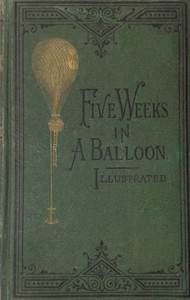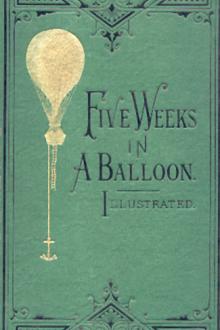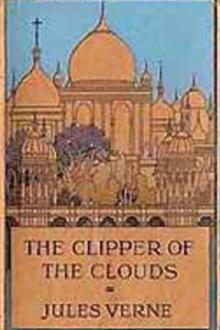Five Weeks in a Balloon<br />Or, Journeys and Discoveries in Africa by Three Englishmen, Jules Verne [english novels to read txt] 📗

- Author: Jules Verne
Book online «Five Weeks in a Balloon<br />Or, Journeys and Discoveries in Africa by Three Englishmen, Jules Verne [english novels to read txt] 📗». Author Jules Verne
“Ah!” said Joe, “do you think, doctor, that the equator passes here?”
“Just here, my boy!”
“Well, then, with all respect to you, sir, it seems to me that this is the very time to moisten it.”
“Good!” said the doctor, laughing. “Let us have a glass of punch. You have a way of comprehending cosmography that is any thing but dull.”
And thus was the passage of the Victoria over the equator duly celebrated.
The balloon made rapid headway. In the west could be seen a low and but slightly-diversified coast, and, farther away in the background, the elevated plains of the Uganda and the Usoga. At length, the rapidity of the wind became excessive, approaching thirty miles per hour.
The waters of the Nyanza, violently agitated, were foaming like the billows of a sea. By the appearance of certain long swells that followed the sinking of the waves, the doctor was enabled to conclude that the lake must have great depth of water. Only one or two rude boats were seen during this rapid passage.
“This lake is evidently, from its elevated position, the natural reservoir of the rivers in the eastern part of Africa, and the sky gives back to it in rain what it takes in vapor from the streams that flow out of it. I am certain that the Nile must here take its rise.”
“Well, we shall see!” said Kennedy.
About nine o’clock they drew nearer to the western coast. It seemed deserted, and covered with woods; the wind freshened a little toward the east, and the other shore of the lake could be seen. It bent around in such a curve as to end in a wide angle toward two degrees forty minutes north latitude. Lofty mountains uplifted their arid peaks at this extremity of Nyanza; but, between them, a deep and winding gorge gave exit to a turbulent and foaming river.
While busy managing the balloon, Dr. Ferguson never ceased reconnoitring the country with eager eyes.
“Look!” he exclaimed, “look, my friends! the statements of the Arabs were correct! They spoke of a river by which Lake Ukéréoué discharged its waters toward the north, and this river exists, and we are descending it, and it flows with a speed analogous to our own! And this drop of water now gliding away beneath our feet is, beyond all question, rushing on, to mingle with the Mediterranean! It is the Nile!”
“It is the Nile!” reëchoed Kennedy, carried away by the enthusiasm of his friend.
“Hurrah for the Nile!” shouted Joe, glad, and always ready to cheer for something.
Enormous rocks, here and there, embarrassed the course of this mysterious river. The water foamed as it fell in rapids and cataracts, which confirmed the doctor in his preconceived ideas on the subject. From the environing mountains numerous torrents came plunging and seething down, and the eye could take them in by hundreds. There could be seen, starting from the soil, delicate jets of water scattering in all directions, crossing and recrossing each other, mingling, contending in the swiftness of their progress, and all rushing toward that nascent stream which became a river after having drunk them in.
“Here is, indeed, the Nile!” reiterated the doctor, with the tone of profound conviction. “The origin of its name, like the origin of its waters, has fired the imagination of the learned; they have sought to trace it from the Greek, the Coptic, the Sanscrit; but all that matters little now, since we have made it surrender the secret of its source!”
“But,” said the Scotchman, “how are you to make sure of the identity of this river with the one recognized by the travellers from the north?”
“We shall have certain, irrefutable, convincing, and infallible proof,” replied Ferguson, “should the wind hold another hour in our favor!”
The mountains drew farther apart, revealing in their place numerous villages, and fields of white Indian corn, doura, and sugar-cane. The tribes inhabiting the region seemed excited and hostile; they manifested more anger than adoration, and evidently saw in the aëronauts only obtrusive strangers, and not condescending deities. It appeared as though, in approaching the sources of the Nile, these men came to rob them of something, and so the Victoria had to keep out of range of their muskets.
“To land here would be a ticklish matter!” said the Scot.
“Well!” said Joe, “so much the worse for these natives. They’ll have to do without the pleasure of our conversation.”
“Nevertheless, descend I must,” said the doctor, “were it only for a quarter of an hour. Without doing so I cannot verify the results of our expedition.”
“It is indispensable, then, doctor?”
“Indispensable; and we will descend, even if we have to do so with a volley of musketry.”
“The thing suits me,” said Kennedy, toying with his pet rifle.
“And I’m ready, master, whenever you say the word!” added Joe, preparing for the fight.
“It would not be the first time,” remarked the doctor, “that science has been followed up, sword in hand. The same thing happened to a French savant among the mountains of Spain, when he was measuring the terrestrial meridian.”
“Be easy on that score, doctor, and trust to your two body-guards.”
“Are we there, master?”
“Not yet. In fact, I shall go up a little, first, in order to get an exact idea of the configuration of the country.”
The hydrogen expanded, and in less than ten minutes the balloon was soaring at a height of twenty-five hundred feet above the ground.
From that elevation could be distinguished an inextricable network of smaller streams which the river received into its bosom; others came from the west, from between numerous hills, in the midst of fertile plains.
“We are not ninety miles from Gondokoro,” said the doctor, measuring off the distance on his map, “and less than five miles from the point reached by the explorers from the north. Let us descend with great care.”
And, upon this, the balloon was lowered about two thousand feet.
“Now, my friends, let us be ready, come what may.”
“Ready it is!” said Dick and Joe, with one voice.
“Good!”
In a few moments the balloon was advancing along the bed of the river, and scarcely one hundred feet above the ground. The Nile measured but fifty fathoms in width at this point, and the natives were in great excitement, rushing to and fro, tumultuously, in the villages that lined the banks of the stream. At the second degree it forms a perpendicular cascade of ten feet in height, and consequently impassable by boats.
“Here, then, is the cascade mentioned by Debono!” exclaimed the doctor.
The basin of the river spread out, dotted with numerous islands, which Dr. Ferguson devoured with his eyes. He seemed to be seeking for a point of reference which he had not yet found.
By this time, some blacks, having ventured in a boat just under the balloon, Kennedy saluted them with a shot from his rifle, that made them regain the bank at their utmost speed.
“A good journey to you,” bawled Joe, “and if I were in your place, I wouldn’t try coming back again. I should be mightily afraid of a monster that can hurl thunderbolts when he pleases.”
But, all at once, the doctor snatched up his spy-glass, and directed it toward an island reposing in the middle of the river.
“Four trees!” he exclaimed; “look, down there!” Sure enough, there were four trees standing alone at one end of it.
“It is Bengal Island! It is the very same,” repeated the doctor, exultingly.
“And what of that?” asked Dick.
“It is there that we shall alight, if God permits.”
“But, it seems to be inhabited, doctor.”
“Joe is right; and, unless I’m mistaken, there is a group of about a score of natives on it now.”
“We’ll make them scatter; there’ll be no great trouble in that,” responded Ferguson.
“So be it,” chimed in the hunter.
The sun was at the zenith as the balloon approached the island.
The blacks, who were members of the Makado tribe, were howling lustily, and one of them waved his bark hat in the air. Kennedy took aim at him, fired, and his hat flew about him in pieces. Thereupon there was a general scamper. The natives plunged headlong into the river, and swam to the opposite bank. Immediately, there came a shower of balls from both banks, along with a perfect cloud of arrows, but without doing the balloon any damage, where it rested with its anchor snugly secured in the fissure of a rock. Joe lost no time in sliding to the ground.
“The ladder!” cried the doctor. “Follow me, Kennedy.”
“What do you wish, sir?”
“Let us alight. I want a witness.”
“Here I am!”
“Mind your post, Joe, and keep a good lookout.”
“Never fear, doctor; I’ll answer for all that.”
“Come, Dick,” said the doctor, as he touched the ground.
So saying, he drew his companion along toward a group of rocks that rose upon one point of the island; there, after searching for some time, he began to rummage among the brambles, and, in so doing, scratched his hands until they bled.
Suddenly he grasped Kennedy’s arm, exclaiming: “Look! look!”
“Letters!”
Yes; there, indeed, could be descried, with perfect precision of outline, some letters carved on the rock. It was quite easy to make them out:
“A. D.”
“A.D.!” repeated Dr. Ferguson. “Andrea Debono—the very signature of the traveller who farthest ascended the current of the Nile.”
“No doubt of that, friend Samuel,” assented Kennedy.
“Are you now convinced?”
“It is the Nile! We cannot entertain a doubt on that score now,” was the reply.
The doctor, for the last time, examined those precious initials, the exact form and size of which he carefully noted.
“And now,” said he—“now for the balloon!”
“Quickly, then, for I see some of the natives getting ready to recross the river.”
“That matters little to us now. Let the wind but send us northward for a few hours, and we shall reach Gondokoro, and press the hands of some of our countrymen.”
Ten minutes more, and the balloon was majestically ascending, while Dr. Ferguson, in token of success, waved the English flag triumphantly from his car.
The Nile.—The Trembling Mountain.—A Remembrance of the Country.—The Narratives of the Arabs.—The Nyam-Nyams.—Joe’s Shrewd Cogitations.—The Balloon runs the Gantlet.—Aerostatic Ascensions.—Madame Blanchard.
“Which way do we head?” asked Kennedy, as he saw his friend consulting the compass.
“North-northeast.”
“The deuce! but that’s not the north?”
“No, Dick; and I’m afraid that we shall have some trouble in getting to Gondokoro. I am sorry for it; but, at last, we have succeeded in connecting the explorations from the east with those from the north; and we must not complain.”
The balloon was now receding gradually from the Nile.
“One last look,” said the doctor, “at this impassable latitude, beyond which the most intrepid travellers could not make their way. There are those intractable tribes, of whom Petherick, Arnaud, Miuni, and the young traveller Lejean, to whom we are indebted for the best work on the Upper Nile, have spoken.”
“Thus, then,” added Kennedy, inquiringly, “our discoveries agree with the speculations of science.”
“Absolutely so. The sources of the White Nile, of the Bahr-el-Abiad, are immersed in a lake as large as a sea; it is there that it takes its rise. Poesy, undoubtedly, loses something thereby. People were fond of ascribing a celestial origin to this king of rivers. The ancients gave it the name of an ocean, and were not far from believing that it flowed directly from the sun; but we must come down from these flights from time to time, and accept what science teaches us. There will not always be scientific men, perhaps; but there always will be poets.”
“We can still see cataracts,” said Joe.
“Those are the cataracts of Makedo, in the third degree of latitude. Nothing could be more accurate. Oh, if we could only have followed the course of the Nile for a few hours!”
“And down yonder, below us, I see the top of a mountain,” said the hunter.
“That is Mount Longwek, the Trembling Mountain of the Arabs. This whole country was visited by Debono, who went through it under the name of Latif-Effendi. The tribes living near the Nile are hostile to each other, and are continually waging a war of extermination. You may form some idea, then, of the difficulties he had to encounter.”
The wind was carrying the balloon toward the northwest, and, in order to avoid Mount Longwek, it was necessary to seek a more slanting current.
“My friends,” said the doctor, “here is where our passage of the African Continent really commences; up to this time we have been following the traces of our predecessors. Henceforth we are to launch ourselves upon the unknown. We shall not lack the courage, shall we?”
“Never!” said Dick and Joe together, almost in a shout.
“Onward, then, and may we have the help of Heaven!”
At ten o’clock at night, after passing over ravines, forests, and scattered villages, the aëronauts





Comments (0)